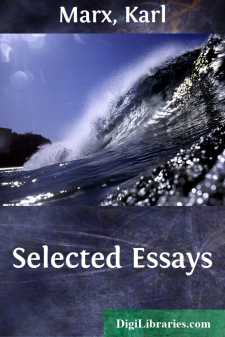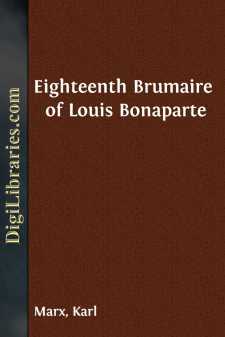Categories
- Antiques & Collectibles 13
- Architecture 36
- Art 48
- Bibles 22
- Biography & Autobiography 813
- Body, Mind & Spirit 142
- Business & Economics 28
- Children's Books 17
- Children's Fiction 14
- Computers 4
- Cooking 94
- Crafts & Hobbies 4
- Drama 346
- Education 46
- Family & Relationships 57
- Fiction 11829
- Games 19
- Gardening 17
- Health & Fitness 34
- History 1377
- House & Home 1
- Humor 147
- Juvenile Fiction 1873
- Juvenile Nonfiction 202
- Language Arts & Disciplines 88
- Law 16
- Literary Collections 686
- Literary Criticism 179
- Mathematics 13
- Medical 41
- Music 40
- Nature 179
- Non-Classifiable 1768
- Performing Arts 7
- Periodicals 1453
- Philosophy 64
- Photography 2
- Poetry 896
- Political Science 203
- Psychology 42
- Reference 154
- Religion 513
- Science 126
- Self-Help 84
- Social Science 81
- Sports & Recreation 34
- Study Aids 3
- Technology & Engineering 59
- Transportation 23
- Travel 463
- True Crime 29
Selected Essays
by: Karl Marx
Categories:
Description:
Excerpt
A CRITICISM OF THE HEGELIAN PHILOSOPHY OF RIGHT
As far as Germany is concerned the criticism of religion is practically completed, and the criticism of religion is the basis of all criticism.
The profane existence of error is threatened when its heavenly oratio pro aris et focis has been refuted.
He who has only found a reflexion of himself in the fantastic reality of heaven where he looked for a superman, will no longer be willing to find only the semblance of himself, only the sub-human, where he seeks and ought to find his own reality.
The foundation of the criticism of religion is: Man makes religion, religion does not make man. Religion indeed is man's self-consciousness and self-estimation while he has not found his feet in the universe. But Man is no abstract being, squatting outside the world. Man is the world of men, the State, society. This State, this society produces religion, which is an inverted world-consciousness, because they are an inverted world. Religion is the general theory of this world, its encyclopædic compendium, its logic in popular form, its spiritualistic Point d'honneur, its enthusiasm, its moral sanction, its solemn complement, its general basis of consolation and justification. It is the fantastic realization of the human being, inasmuch as the human being possesses no true reality. The struggle against religion is therefore indirectly the struggle against that world whose spiritual aroma is religion.
Religious misery is in one mouth the expression of real misery, and in another is a protestation against real misery. Religion is the moan of the oppressed creature, the sentiment of a heartless world, as it is the spirit of spiritless conditions. It is the opium of the people.
The abolition of religion, as the illusory happiness of the people, is the demand for their real happiness. The demand to abandon the illusions about their condition is a demand to abandon a condition which requires illusions. The criticism of religion therefore contains potentially the criticism of the Vale of Tears whose aureole is religion.
Criticism has plucked the imaginary flowers which adorned the chain, not that man should wear his fetters denuded of fanciful embellishment, but that he should throw off the chain, and break the living flower.
The criticism of religion disillusions man, so that he thinks, acts, shapes his reality like the disillusioned man come to his senses, so that he revolves around himself, and thus around his real sun. Religion is but the illusory sun which revolves around man, so long as he does not revolve around himself.
It is therefore the task of history, once the thither side of truth has vanished, to establish the truth of the hither side.
The immediate task of philosophy, when enlisted in the service of history, is to unmask human self-alienation in its unholy shape, now that it has been unmasked in its holy shape. Thus the criticism of heaven transforms itself into the criticism of earth, the criticism of religion into the criticism of right, and the criticism of theology into the criticism of politics....



